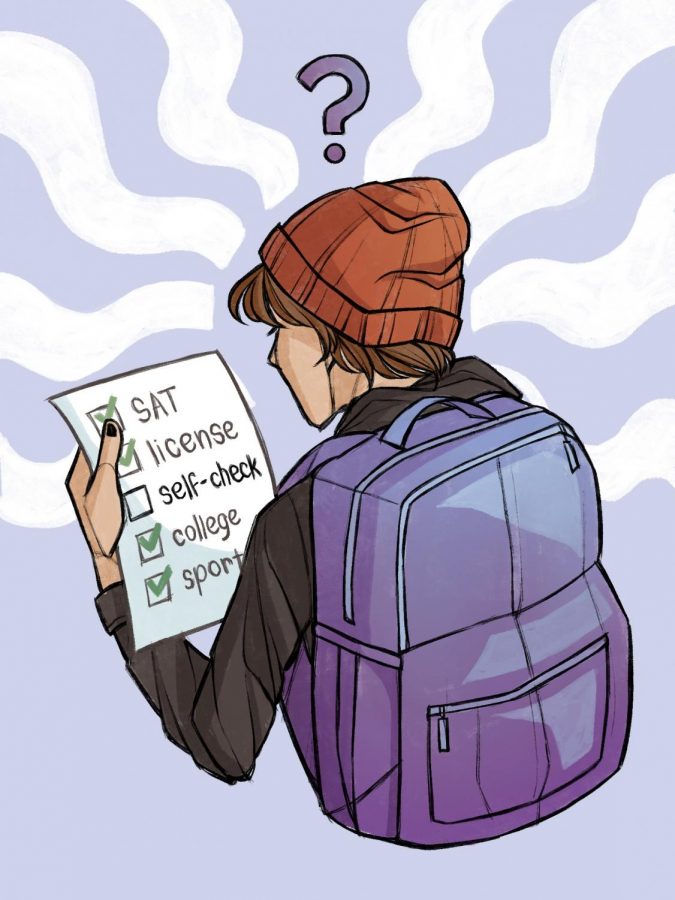FOCUS: Imposter syndrome defeats SCHS students 42-0
Many students felt unprepared returning to an in-person learning environment after a year of distance learning.
Following a long school day, a student recollects themselves in the SCHS parking lot. After removing their mask, they take a deep breath.
Reflecting on the 2020-2021 virtual school year and looking toward the future, students shared concerns about academics, school events and self-care. Along with self-criticism, many students have undergone significant changes in the past year, mostly stemming from the loss of a year’s learning. This phenomenon is referred to as the Imposter Syndrome.
Sophomore Jeremy Flint felt unprepared when returning to in-person learning.
“The workload as a sophomore is significantly greater than when I was a freshman,” Flint said. “I don’t think I was as prepared for it since I was not able to develop healthy study habits while in quarantine.”
According to NBC news, 42 percent of high school students in 2021 experienced a decrease in engagement during virtual learning. With the stress of a new year already underway, many students worry about their approaching future.
Senior Richard Westlake explained he felt unprepared with the approaching timing of the college process. Westlake also shared the thought of feeling unprepared comes from an issue with undeveloped learning habits.
“It (online school) would prevent me from learning because I could just look up everything,” Westlake said. “It’s going by fast, and I think I haven’t learned as much. Maybe I should be learning more before I go to college.”
SCHS Wellness Center Outreach Worker, Dupe Thomas, acknowledged the stress associated with the future and harsh expectations for in-person learning.
“There’s so much emphasis on all the external stuff: college, getting great grades and passing and pleasing everybody,” Thomas said. “I do think there are a lot of expectations for both students and staff coming back to school that are unrealistic.”
In addition to stress surrounding academics, students reflected on the moments and regrets with school events.
Senior Kaitlyn Butcher shared her identity as a senior, including her disappointment toward missing out on school events.
“I feel like in previous years, I didn’t really cherish those events or take as many advantages as I should have,” Butcher said. “Seeing that it’s finally my senior year, I’m really trying to make the most of every opportunity that I get.”
Along with the SCHS community, students across the country have been dealing with self-doubt. NBC news reported that facing a new set of challenges outside one’s comfort zone can trigger a decrease in the idea of self-worth. During the pandemic, many students felt they were not meeting the expected standards.
Thomas shared her perspective as a staff member who has witnessed the Imposter Syndrome affect two similar grades.
“Both sophomores and freshmen classes have been labeled as being a bit more immature, but the back side of that is they just haven’t been acquainted and introduced to high school in the same way that the juniors and seniors have,” Thomas said. “I think they need some grace.”
SCHS Wellness Coordinator, Michelle Sandoval, indicated stress is the main cause of why students do not fit the character of their grade.
“There’s a level of maturity that comes with being in high school that I think is lacking for some people,” Sandoval said. “This kind of stress has pushed them to mature faster than they may have abnormally needed to, and it’s unhealthy in the sense that it rushes systems that are natural and normal in human evolution.”
After acknowledging their personal obstacles with virtual learning and contemplating their next steps with a syndrome threatening their identity, students look toward the future.
“As we begin to see COVID in the rearview mirror, I’m hoping that the troubles we experienced will go along with it,” Flint said.


